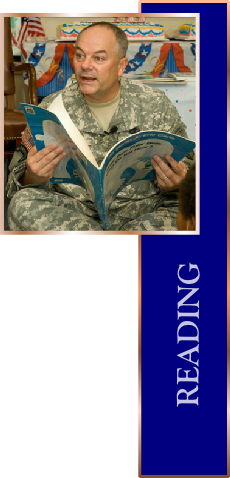




Copyright © 2024 Rob Johnson All rights reserved -




Reading a good book
Studies have shown that American children who learn to read by the third grade are less likely to end up in prison, drop out of school, or take drugs. Seventy percent of prison inmates score in the bottom quarter on reading tests. Adults who read literature on a regular basis are nearly three times as likely to attend a performing arts event, almost four times as likely to visit an art museum, more as two-
The Importance of Reading to Infants and Young Children
Most of us know that it is good to read to our children every day, but few of us are aware of the newest discoveries in neuroscience, showing that reading aloud actually stimulates the growth of a baby's brain.
Before the age of 1, a child has twice as many brain cells as an adult. The more these are stimulated by reading, singing, games, etc., the more brain cells will remain when the child becomes an adult. This new understanding, of how the brain develops and the crucial role of early language experiences, including reading, came about in the past few years, due to a burst of research activity. Extraordinary advances in neuroscience have been facilitated by the development of sophisticated research tools such as brain imaging technologies, making it possible to study the actual growth and working of the brain.

What the research shows:
- An infant's brain structure is not entirely genetically determined. Early experiences have a decisive impact on the architecture of a baby's brain. How humans develop and learn depends critically and continually on the interplay between an individual's genetic endowment and the nutrition, surroundings, care, stimulation, and teaching that are provided or withheld.
- “A child care provider reads to a toddler. And in a matter of seconds, thousands of cells in these children's growing brains respond. Some brain cells are 'turned on', triggered by this particular experience. Many existing connections among brain cells are strengthened. At the same time, new brain cells are formed, adding a bit more definition and complexity to the intricate circuitry that will remain largely in place for the rest of these children's lives."
- the development of early literacy skills through early experiences with books and stories is critically linked to a child's success in learning to read.
- Development of literacy is a continuous process that begins early in life and depends heavily on environmental influences.
- Children who are read to from an early age are more successful at learning to read.).
- "...reading aloud to children is the single most important intervention for developing their literacy skills," according to a 1985 study by the National Commission on Reading.
- Early reading experiences are now recognized as being of such importance that the American Academy of Pediatrics recommends that "pediatricians prescribe reading activities along with other instructions given to parents at the time of well-
child visits." The President of the Academy, Dr. Robert E. Hannemann, stated: "We strongly recommend daily reading to children from six months of age."

Selecting a Book That Interests You
Here is a quick guide on looking for reading material:
1. Based on what I am interested in
2. Look for interesting titles
3. Books in a series -
4. Read the book summary on the back of the book
5. Look for a comfortable reading level
6. Select an Author you like
7. Look at the picture on the cover
8. If someone recommends the book



